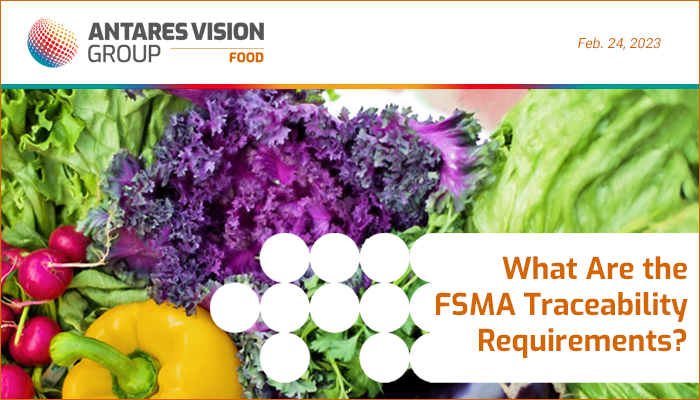The Food Safety and Modernization Act (FSMA) is the most significant development in food industry traceability. One specific set of requirements in the law, the Final Rule on Requirements for Additional Traceability Records for Certain Foods, is reshaping and modernizing the approach to food safety and food supply chain data.
Whether you’re a grower, processor, distributor, or retailer in the food industry, understanding and implementing FSMA traceability is vital. Let’s walk through FSMA traceability requirements so you can adapt to the FDA’s Food Traceability Final Rule and ensure your compliance.
What Is FSMA Traceability?
FSMA traceability refers to the ability to track every step of a food product’s journey from farm to table, as required by the law. It’s primary goal is to help prevent and mitigate foodborne illnesses
FSMA traceability requirements center around creating, maintaining, and sharing a clear record of where food comes from, where it was, where it is now, where it’s going, and who’s handling it.
Under FSMA, the Food Traceability Final Rule defines additional recordkeeping requirements all those who manufacture, process, pack, or hold foods on the Food Traceability List (FTL), which includes cheeses, shellfish, and certain fruits and vegetables. It provides you and your trading partners with clear guidance on what data you must keep and share as your products move across your supply chain.
The FDA’s Role in FSMA Traceability
The Food and Drug Administration plays a pivotal role in FSMA traceability: It sets FSMA traceability requirements, evaluates foods using a risk-ranking model, and holds stakeholders accountable for complying with the act. In addition to setting traceability recordkeeping requirements, the FDA also assesses penalties for non-compliance with the traceability program.
Compliance Requirements for Food Industry Professionals
FSMA 204 and other provisions of FSMA apply to:
- Harvesters
- Coolers
- Packers
- Processors
- Distributors
- Retail food establishments
The specific requirements for your business will vary based on your role in the food supply chain. Many requirements focus on initial packing and labeling; proper packaging and labeling promote FSMA traceability and streamline the flow of goods along the supply chain.
FSMA 204 also requires using traceability lot codes, developing a traceability plan, and sharing records with the FDA when requested.
Benefits of FSMA Traceability
Embracing traceability promotes better food safety and protects consumers from foodborne illnesses. If an issue arises with one of your products, you can use traceability data to quickly find where it came from and where it is now. This granular, read-time information expedites recalls and ensures that all affected products are removed from store shelves as quickly as possible.
From a business perspective, FSMA 204 helps you protect your brand image, as you can ensure the quality, integrity, and safety of food products. In addition to enhancing your reputation, you can use FSMA traceability to identify bottlenecks within the supply chain and eliminate waste.
Technology and Tools for FSMA Traceability
FSMA gives the FDA the authority to establish modern, science- and risk-based requirements, including all the traceability requirements in Section 204.
The law dovetails with the Agency’s New Era of Smarter Food Safety, which is “a new approach to food safety, leveraging technology and other tools and approaches to create a safer and more digital, traceable food system.” It will the FDA identify ways to further its modernization goals and help ensure that the regulations evolve with the industry and available technology to reduce foodborne illness.
So, what we’re seeing with FSMA 204 is part of the FDA’s plan to secure the food supply chain using technology. FSMA traceability, anchored by requirements for food companies to record and share Critical Tracking Events (CTEs) and Key Data Elements (KDEs), is attainable with currently available digital supply chain technology.
Other requirements, such as using traceability lot codes and having systems to share electronic sortable spreadsheets with traceability information to the FDA, are also part of a strategic approach to leveraging technology for FSMA compliance.
Food supply chain traceability software is the best road to meeting technological requirements and FSMA compliance. It’s also the best way to ensure you remain compliant and competitive as regulations, food trends, and consumer attitudes evolve.
Common FSMA Traceability Challenges
Challenges to complying with FSMA traceability regulations include the following:
- Integrating traceability systems with existing processes: Adding any new tech tool to your established systems/process could disrupt operations, including interactions with trading partners.
- Ensuring your partners are preparing: Traceability requires participation from everyone in the supply chain. Talking with your trading partners about FSMA readiness is vital to being ready to comply by the January 2026 deadline.
- Training staff: You’ll need to educate and train staff on FSMA 204 compliance and the effect it will have on your business. Training is also necessary to create a culture of food safety in your organization.
- Managing data: Complying with FSMA means you will be creating, sharing, accessing, and storing massive amounts of data. Your systems not only have to handle the volume — they must ensure the data is compliant.
Navigating the challenges requires a holistic approach. First and foremost, you need to get your team on board by being transparent about the regulations, how they will affect your daily operations, people’s roles and responsibilities, and what you are doing to prepare.
The Importance of Data Security and Privacy
With so much sensitive data being generated, security and privacy are paramount. You need to make sure that your traceability data is protected from unauthorized access and breaches. This means investing in secure systems and being mindful of privacy laws and regulations.
Additionally, you must ensure that your partners are doing their part to promote data security. Remember, you’ll need to integrate some of your technologies with theirs to expedite the flow of traceability data. You don’t want to inadvertently create a blind spot or weak link in your data infrastructure by partnering with a vendor that does not take data security as seriously as you do.
Anticipating Regulatory Audits
Nobody wants to be audited, but everybody should be prepared. The key to passing an audit is to make food safety and FSMA compliance part of your company culture. If these are only afterthoughts or simply a box to check, the chances of failing an audit are much higher. In contrast, being proactive means an audit will essentially be a formality (and become an opportunity to stand out among competitors).
Final Thoughts: FSMA Traceability with rfxcel
Familiarizing yourself with FSMA traceability requirements will help you achieve and maintain compliance, improve food safety, and preserve your brand image. Prioritize compliance and implement effective traceability practices by partnering with rfxcel. We’ve been a leader in traceability (and compliance) technology for 20 years, and we will work with you to develop a solution suited to your needs.
Book a demo to learn more. We also invite you to explore our other FSMA resources.





